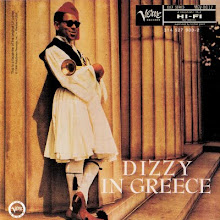The 1950s was the golden era of televised jazz. Nearly all jazz greats of the time appeared on syndicated TV. This post is dedicated to them.
CBS producer Robert Herridge (seen talking on first clip) brought to CBS studio 61 in NYC on April 2, 1959 Miles Davis, John Coltrane, Wynton Kelly, Paul Chambers and Jimmy Cobb to give us their masterpiece "So What".
This date was taped for The Sound of Miles Davis, an installment of The Robert Herridge Theater. Altoist Cannonball Adderley, a regular member of this band, was absent because of a migraine headache, which may explain why Davis solos twice on "So What," both before and after Coltrane. Broadcast on July 21, 1960. A jazz moment to cherish forever.
From the same date as above, Miles Davis, John Coltrane on alto, Jimmy Cobb and Paul Chambers join forces with The Gil Evans Orchestra to give us Dave Brubeck's "The Duke". Big band jazz with a twist indeed!
Personnel:
Miles Davis (tpt, flh); John Coltrane ( as); Paul Chambers (b); Jimmy Cobb (d); Ernie Royal (tpt); Clyde Reisinger (tpt); Louis Mucci (tpt); Johnny Coles (tpt); Emmett Berry (tpt); Frank Rehak (tb); Jimmy Cleveland (tb); Bill Elton (tb); Rod Levitt (valve tb); Julius Watkins (frh); Robert Northern (frh); Bill Barber (tuba); Romeo Penque (cl, fl); Eddie Caine (cl, fl); Danny Bank (bcl); Gil Evans (arr, cond)
Ahmad Jamal's tasty tune "New Rhumba", same personnel as above
Gil Evans' "Blues For Pablo", same personnel as above
That's all for now folks, enjoy.
Sol Schlinger, Baritone Sax Extraordinaire
2 years ago


